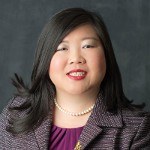To help prospective students better research their options for earning a master’s degree in communication, we interviewed alumni from a range of different programs offered by schools across the country. This page features interviews with three graduates of Texas Christian University’s Master of Science in Communication Studies program. TCU alumni Morgan April, Kaitlin Phillips, and Tiffany Wang were kind enough to share detailed insights related to their studies, including why they chose the MS program, how it was structured, what went into completing their thesis, and more.
TCU offers two different master’s in communication programs through its Bob Schieffer College of Communication: the Master of Science in Communication Studies and a Master of Science in Strategic Communication. For an in-depth look at their Communication Studies program, check out the interviews below.
Alumni Interviews
Interview with Kaitlin Phillips, Ph.D. - 2013 Graduate
"All of the classes I took at TCU and the skills I gained in those classes have helped me in my academic career, both in research and in teaching. However, what benefited me the most, and continue to be a blessing in my life are the faculty. They are wonderful mentors, and academic colleagues, and they continue to offer guidance and advice, and I am so grateful for the friendships I formed while at TCU."
Interview with Morgan April - 2017 Graduate
"Some of my biggest takeaways from TCU’s program have been my depth of knowledge in communication theory, my strong base in quantitative methods, and my connections with both faculty and peers... the connections I made with the faculty have provided me with opportunities, continuous support, and friendships."
Interview with Tiffany Wang, Ph.D. - 2009 Graduate
"Through TCU’s social scientific program focus, I was exposed to a wide variety of theories, methods, and real-world applications. My faculty mentors at TCU made a strong effort to include skills and strategies that could be applied in both career and academic contexts, because we had graduate students who were transitioning directly to a professional opportunity post-graduation as well as graduate students who were pursuing advanced academic and professional degrees post-graduation."



